News & Media
Unisa and Maluti TVET College host inaugural seminar
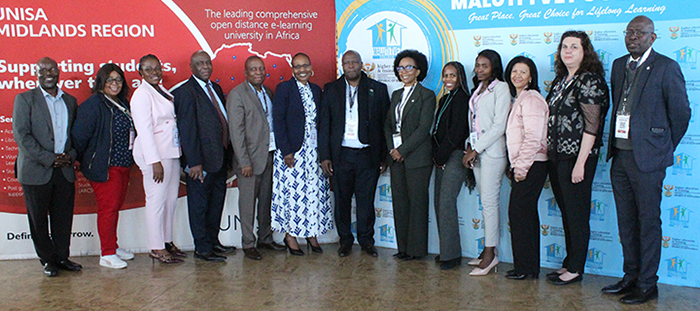
Unisa and Mauti TVET College staff with guests
Unisa’s Midlands Region, in collaboration with the Maluti TVET College, hosted a seminar on 1 and 2 October 2025 at the Thabo Mofutsanyana District Municipality, Phuthaditjhaba, in the Free State province, under the theme Harnessing Digital Transformation in Education for Skills Transfer and Curriculum Innovation.
In his welcome address, Motlalepula Tsotetsi, the Principal of the Maluti TVET College, stated that the seminar marks a significant milestone in the strategic alliance between Maluti TVET College and Unisa, and that this collaboration represents a paradigm shift towards technology that enables education within the post-school education and training (PSET) sector. He further indicated that the collaborative efforts aim at leveraging digital transformation for enhanced skills transfer and curriculum innovation.
This seminar was driven by the understanding that the evolution of the higher education (HE) landscape requires an adaptive delivery mechanism. "Industries are crucial as graduates are soon to be employed in various industries and sectors and should be part of the economic activities of the country," he said. "We need to address the contemporary socio-economic challenges, particularly those prevalent in the rural context, while striving to address the transformation imperative while rigorously maintaining academic rigour and industry relevance."
Acting Director of the Unisa Midlands Region, Angie Bopape, outlined the purpose of the seminar, which was to unite diverse stakeholders in building an expanded, effective and integrated post-school system that directly contributes to eliminating poverty, reducing inequality and creating the Africa we want. She referred to Agenda 2063 and the National Development Plan (NDP), highlighting that there is a critical role that digital transformation should play in driving sustainable and inclusive economic development: "To build a PSET system that is coordinated and that can expand access to quality higher education, we need to integrate education, training and technology," she said.
Bopape invited stakeholders to open doors for partnerships, allowing opportunities such as joint research projects, work-integrated learning for students, community outreach and engagement, exchange programmes, and skills development. "These opportunities should be impactful, transformative and contribute towards the NDP goals and the Africa we want," she said. "They must be explored across and outside the PSET sector, the country, the SADC region and throughout our continent." She urged all participants to rekindle the role they play in the development not only of South Africa and the SADC region, but also of Africa as a whole.
Trevor Rammitlwa, Chief Executive Officer of the National Electronic Media Institute of South Africa, delivered the keynote address on scaling digital skills for a future-ready workforce, focusing on strategies for inclusive innovation and curriculum transformation in South Africa.
Rammitlwa shared the human capital challenges faced in the country, such as slow economic growth, skills mismatch and inequalities stemming from gender, race and disabilities. He suggested that a collaborative ecosystem between the public and private sectors is needed to address the digital skills gap. "Digital skills do not stand alone; they exist in the ecosystem, to ensure that the digital transformation initiatives are successful," he added. He stated that scaling digital skills transfer requires a coordinated ecosystem comprising collaboration between the private and public sectors in underserved communities, as well as training service providers, to achieve impactful outcomes.
He emphasised that institutions should ensure the development of relevant skills for a future-ready workforce and stated that it is essential to understand the economic and stakeholder landscape in curriculum innovation and development. He identified several strategies that may be used for inclusive innovation and curriculum transformation, including research and innovation, impactful partnerships, curriculum development and delivery, learner transition and effective assessment.
Prof Sindile Ngubane, Head of Department, Institute for Open and Distance Learning at Unisa’s College of Education, delivered an address titled "Bridging the digital gap: Inclusive digital transformation strategies for online and blended learning in marginalised communities". She stated that without inclusive digital access, marginalised youth may be left behind. "When you think inclusive, you think development," she said. She continued by saying that vocational education and training are fundamental for employability and self-employment in African countries; therefore, there is a need to train young people to use artificial intelligence correctly.
In addition, it is critical to integrate digital tools into teaching, learning, assessment, student support and administration, not forgetting access, participation, equity and relevance to marginalised communities. "We need to prioritise vocational skills," she added. Although there are barriers that may affect the digital vocational learning, such as infrastructure, device access and affordability, digital literacy gaps, curriculum issues, policy and funding gaps, she identified the frameworks that can guide inclusive vocational digital transformation, which include, amongst others, technology, pedagogical and content knowledge for educator readiness, a capacity approach focusing on what learners can do, disability inclusion, and policy frameworks. To ensure relevance and accessibility, she stated that there should be alignment in curricula with emerging digital skills demands, the use of blended and online models, and the inclusion of soft, entrepreneurial and digital skills.
Ngubane stated that there is a need to develop national frameworks for digital vocational learning, inclusive of marginalised groups, to invest in training and support, and to ensure affordable and reliable access to devices and connectivity. Furthermore, Ngubane stated that there is a need to build blended and flexible modes that can adapt to local constraints and ensure robust monitoring and feedback loops. She urged stakeholders to collaborate and take action for the sake of Africa’s future generations.
Molehe Wesi, Chief Executive Officer of the .za Domain Name Authority (ZADNA), presented on "Securing the digital future, focusing on strategies for enhancing cybersecurity and digital literacy in the South African Education sector". He stated that rural and under-resourced institutions are facing high cyber risks due to weak infrastructure, limited gadgets and low awareness. Recently, concerns have been raised regarding poor access and expensive data costs. He identified possible cyber threats facing HEIs, including ransomware, phishing, cloud leakage and data breaches.
He suggested that institutions should consider offering cyber training for staff and students to equip them with the necessary skills to address these challenges. Furthermore, there is a need to enforce the Protection of Personal Information Act (POPIA). To secure the digital futures, Wesi identified strategic pillars, which include cybersecurity by design, embedding digital literacy, empowering disadvantaged institutions, capacity and governance.
Dr Andronucus Akinyelu, a lecturer at the Computer Science and Informatics Department of the University of the Free State, brought a different perspective on leveraging AI and big data to drive curriculum innovation and personalised learning in HE. In his presentation, he highlighted the challenges faced by HE, including skills mismatches, a lack of mentorship, a generic curriculum, and the high rate of dropouts. "However," he continued, "AI tools are available to make education inclusive, personalised and relevant. To succeed, institutions need to invest in infrastructure, establish centres of excellence, and promote support policies. Let us shape the education system through AI to ensure that no student is left behind."
Over the two-day seminar, the programme featured various presentations aligned to the topic of the year, "Harnessing Digital Transformation in Education for Skills Transfer and Curriculum Innovation". The presentations explored the landscape of digital transformation in education, its challenges and recommendations to consider reshaping the HEIs with digital skills that are aligned with the industry needs.
The successful seminar brought together stakeholders from various institutions of higher learning and TVET colleges, including the private and public sectors. Furthermore, the seminar provided an opportunity for participants to network and to share valuable information and ideas.
* By Thotogelo Masenya, Communication and Marketing Officer, Midlands Region
Publish date: 2025-10-27 00:00:00.0


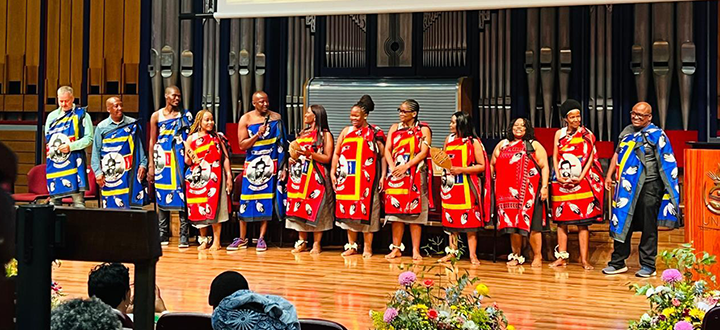 Unisa showcases SA's multilingual heritage
Unisa showcases SA's multilingual heritage
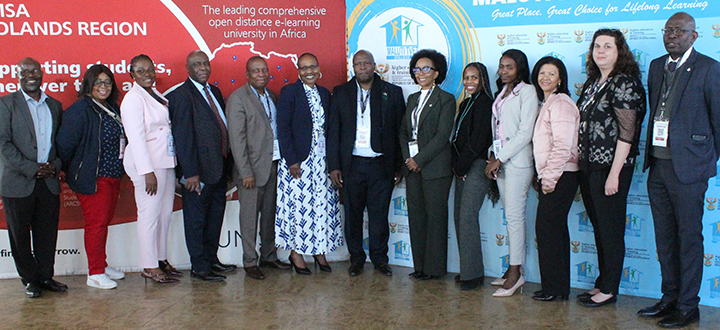 Unisa and Maluti TVET College host inaugural seminar
Unisa and Maluti TVET College host inaugural seminar
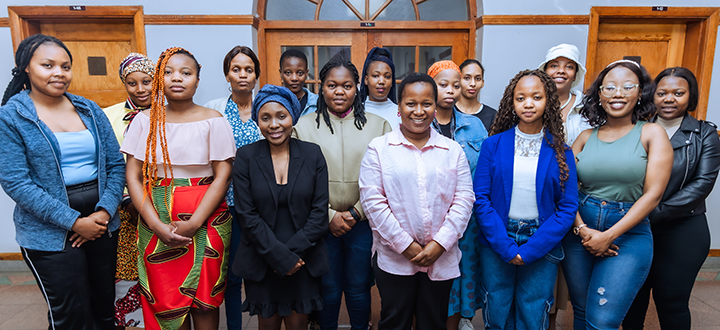 Second cohort of the Bosadi Artisan Creative Media Business Start-up Programme launched
Second cohort of the Bosadi Artisan Creative Media Business Start-up Programme launched
 Percy Qoboza remains a luminary voice for truth and justice in the digital era
Percy Qoboza remains a luminary voice for truth and justice in the digital era
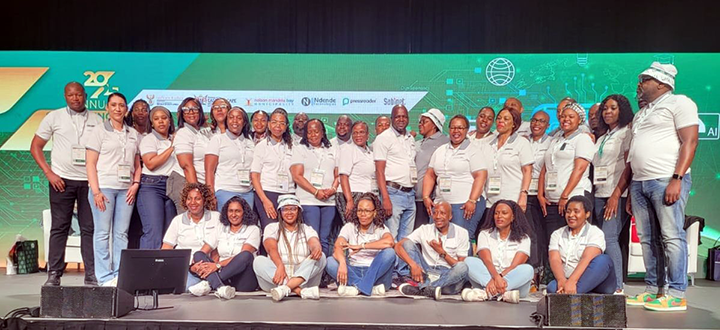 Unisa celebrates excellence at LIASA Conference
Unisa celebrates excellence at LIASA Conference